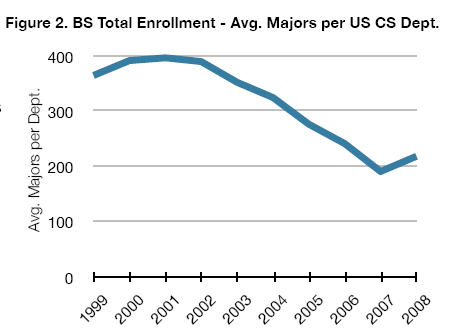Computer science programs stage comeback in 2008

For the first time in six years, enrollment in computer science programs in the United States increased last year, according to an annual survey [PDF] conducted by the Computing Research Association.
Previously declining numbers of science and engineering students has been considered a "canary-in-a-coal-mine" indicator reflecting America's waning ability to compete in the global economy.
The number of majors and pre-majors in American computer science programs was up 6.2 percent from 2007, according to the Taulbee Survey, which follows trends in student enrollment, degree production, employment and faculty salaries for computer science, computer engineering and schools of information in the U.S. and Canada.
After years of growth alongside the maturation of the Internet, the academic discipline that met crisis after the dot-com bubble burst around 2000, redirecting college graduates toward careers in investment banking and financial engineering.
The current recession may have reverted that trend.
The Taulbee Survey, with data tables covering different time periods, also found that the number of new undergraduate majors in computer science increased 9.5 percent and that the rate of decline in new bachelor's degrees improved to 10 percent, from 20 percent in the previous report.
PhD production grew to 1,877 for the period July 2007 to June 2008, a 5.7 percent increase over the previous period.
No longer is computer science considered a career filled with the drudgery of staring at computer monitors and writing endless lines of code; now, computer science skills are increasingly seen as the foundation for a variety of careers in a webified world.
Still, the survey revealed that diversity in computer science programs continues to remain poor: for example, the fraction of bachelor's degrees awarded to women remained steady at 11.8 percent in 2008.
The Computing Research Association is an organization representing 200 North American academic departments of computer science, computer engineering and related fields; 26 industrial research labs; and 6 affiliated professional societies.
More on ZDNet:
- Christopher Dawson: Is computer science the one smart major in a recession?
- Andrew Nusca: What's driving women out of computer science?
- Zack Whittaker: UK CS graduates more likely to be unemployed
- Alex Moskalyuk: 20% drop in computer science majors in 2008
- Christopher Dawson: Pumping up the Comp Sci pipeline
